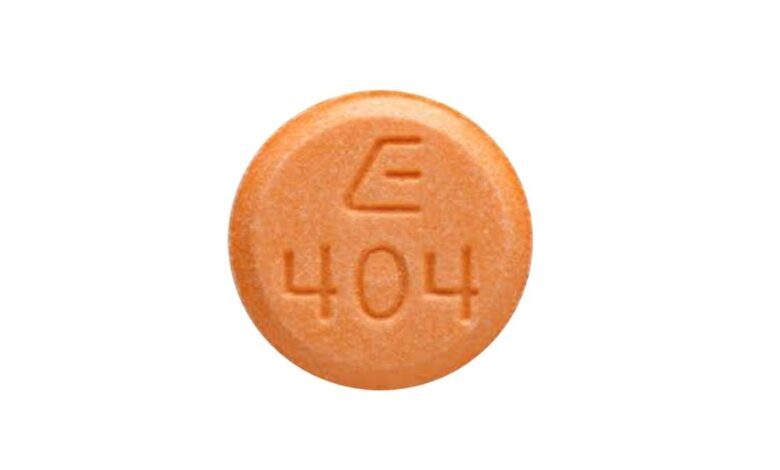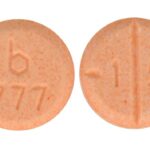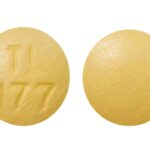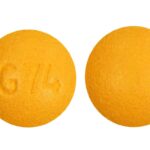E 404 Orange Pill: Uses, Dosage, Side Effects, Abuse

The round, orange pill with the imprint E 404 has been identified as Amphetamine and Dextroamphetamine 30 mg supplied by Sandoz Pharmaceuticals Inc.. Amphetamine and dextroamphetamine combination like E 404 pill is used to treat attention-deficit hyperactivity disorder (ADHD) and narcolepsy (uncontrollable desire for sleep or sudden attacks of deep sleep). These two medicines belong to the group of medicines called central nervous system (CNS) stimulants.
E 404 pill works in the treatment of ADHD to increase attention and decrease restlessness in patients who are overactive, cannot concentrate, or are easily distracted. It is used as part of a total treatment program that also includes social, educational, and psychological therapy.
This medicine is available only with a doctor’s prescription. Prescriptions cannot be refilled. A new prescription must be obtained from your doctor each time you need this medicine.
What special precautions should I follow?
Before taking dextroamphetamine and amphetamine,
• tell your doctor and pharmacist if you are allergic to amphetamine, dextroamphetamine, other stimulant medications such as benzphetamine, lisdexamfetamine (Vyvanse), or methamphetamine (Desoxyn); any other medications, or any of the ingredients in dextroamphetamine and amphetamine preparations. Ask your pharmacist for a list of the ingredients.
• tell your doctor if you are taking the following medications or have stopped taking them in the past 14 days: monoamine oxidase (MAO) inhibitors including isocarboxazid (Marplan), linezolid (Zyvox), methylene blue, phenelzine (Nardil), selegiline (Eldepryl, Emsam, Zelapar), or tranylcypromine (Parnate). If you stop taking dextroamphetamine and amphetamine, you should wait at least 14 days before you start to take an MAO inhibitor.
• tell your doctor and pharmacist what other prescription and nonprescription medications, vitamins, and herbal products you are taking. Be sure to mention any of the following: acetazolamide (Diamox); alpha blockers such as alfuzosin (Uroxatral), doxazosin (Cardura), prazosin (Minipress), tamsulosin (Flomax, in Jalyn), and terazosin; antacids and other medications for heartburn or ulcers such as cimetidine (Tagamet), esomeprazole (Nexium), omeprazole (Prilosec, in Zegerid), and pantoprazole (Protonix); antidepressants (‘mood elevators’); antihistamines (medications for colds and allergies); ascorbic acid (Vitamin C); beta blockers such as atenolol (Tenormin), labetalol (Trandate), metoprolol (Lopressor, Toprol XL), nadolol (Corgard), and propranolol (Inderal, Innopran); buspirone; chlorpromazine; fentanyl (Actiq, Duragesic, Subsys, others); guanethidine (no longer available in U.S.); lithium (Lithobid); meperidine (Demerol); methenamine (Hiprex, Urex); medications for migraine headaches such as almotriptan (Axert), eletriptan (Relpax), frovatriptan (Frova), naratriptan (Amerge), rizatriptan (Maxalt), sumatriptan (Imitrex, in Treximet), and zolmitriptan (Zomig); quinidine (in Nuedexta); reserpine; ritonavir (Norvir, in Kaletra); certain medications for seizures such as ethosuximide (Zarontin), phenobarbital, and phenytoin (Dilantin, Phenytek); selective serotonin-reuptake inhibitors such as citalopram (Celexa), escitalopram (Lexapro), fluoxetine (Prozac, Sarafem, in Symbyax), fluvoxamine (Luvox), paroxetine (Brisdelle, Prozac, Pexeva), and sertraline (Zoloft); serotonin and norepinephrine reuptake inhibitors such as desvenlafaxine (Khedezla, Pristiq), duloxetine (Cymbalta), milnacipran (Savella), and venlafaxine (Effexor); sodium bicarbonate (Arm and Hammer Baking Soda, Soda Mint); sodium phosphate; certain thiazide diuretics (‘water pills’); tramadol (Conzip, in Ultracet); or tricyclic antidepressants (‘mood elevators’) such as desipramine (Norpramin) or protriptyline (Vivactil). Your doctor may need to change the doses of your medications or monitor you carefully for side effects.
• tell your doctor what herbal products you are taking, especially St. John’s wort and tryptophan or nutritional supplements including glutamic acid (L-glutamine).
• tell your doctor if you have glaucoma (increased pressure in the eye that may cause vision loss), hyperthyroidism (condition in which there is too much thyroid hormone in the body), or feelings of anxiety, tension, or agitation. Your doctor will probably tell you not to take dextroamphetamine and amphetamine.
• tell your doctor if anyone in your family has or has ever had an irregular heartbeat or has died suddenly. Also tell your doctor if you have recently had a heart attack and if you have or have ever had a heart defect, high blood pressure, an irregular heartbeat, hardening of the arteries, heart or blood vessel disease, or other heart problems. Your doctor will examine you to see if your heart and blood vessels are healthy. Your doctor will probably tell you not to take dextroamphetamine and amphetamine if you have a heart condition or if there is a high risk that you may develop a heart condition.
• tell your doctor if you or anyone in your family has or has ever had depression, bipolar disorder (mood that changes from depressed to abnormally excited), or mania (frenzied, abnormally excited mood), motor tics (repeated uncontrollable movements), verbal tics (repetition of sounds or words that is hard to control), or Tourette’s syndrome (a condition characterized by the need to perform repeated motions or to repeat sounds or words), or has thought about or attempted suicide. Also tell your doctor if you have or have ever had mental illness, seizures, an abnormal electroencephalogram (EEG; a test that measures electrical activity in the brain), or liver or kidney disease.
• tell your doctor if you are pregnant, plan to become pregnant, or are breastfeeding. If you become pregnant while taking dextroamphetamine and amphetamine, call your doctor. Do not breastfeed while taking dextroamphetamine and amphetamine.
• talk to your doctor about the risks and benefits of taking dextroamphetamine and amphetamine if you are 65 years of age or older. Older adults should not usually take dextroamphetamine and amphetamine because it is not as safe as other medications that can be used to treat the same condition.
• you should know that this medication may make it difficult for you to perform activities that require alertness or physical coordination. Do not drive a car or operate machinery until you know how this medication affects you.
• you should know that dextroamphetamine and amphetamine should be used as part of a total treatment program for ADHD, which may include counseling and special education. Make sure to follow all of your doctor’s and/or therapist’s instructions.
• you should know that dextroamphetamine and amphetamine may cause sudden death in children and teenagers, especially children and teenagers who have heart defects or serious heart problems. This medication also may cause sudden death, heart attack, or stroke in adults, especially adults with heart defects or serious heart problems. Call your or your child’s doctor right away and get emergency help, if you or your child has any signs of heart problems while taking this medication including: chest pain, shortness of breath, or fainting.
How should I use E 404 Pill?
This medication should be started at the lowest possible dose and increased slowly. The usual dose of Adderall is 2.5-60 mg daily administered in one or three doses. E 404 pill is not recommended for children under 6 years of age. The timing of this medication is very important. Generally, a long-acting form of the medication should not be taken in the evening, as it may interfere with sleep.
Many things can affect the dose of medication that a person needs, such as body weight, other medical conditions, and other medications. If your doctor has recommended a dose different from the ones listed here, do not change the way that you are taking the medication without consulting your doctor.
It is important to take this medication exactly as prescribed by the doctor. If you miss a dose, take it as soon as possible and continue with your regular schedule. If it is almost time for your next dose, skip the missed dose and continue with your regular dosing schedule. Do not take a double dose to make up for a missed one. If you are not sure what to do after missing a dose, contact your doctor or pharmacist for advice.
What special dietary instructions should I follow?
Unless your doctor tells you otherwise, continue your normal diet.
What should I do if I forget a dose?
If you miss your dose of the extended-release capsule in the morning, skip the missed dose and take your next dose at the regular time the next day. Do not take a dose later in the day. Do not take a double dose to make up for a missed one.
What are the side effects of E 404 pill?
E 404 pill may cause side effects. Tell your doctor if any of these symptoms are severe or do not go away:
• nervousness
• headache
• changes in sex drive or ability
• painful menstrual cramps
• dry mouth
• constipation
• diarrhea
• nausea
• weight loss
Some side effects can be serious. If you experience any of the following symptoms, call your doctor immediately or get emergency medical treatment:
• slow or difficult speech
• dizziness
• weakness or numbness of an arm or leg
• seizures
• motor or verbal tics
• teeth grinding
• depression
• believing things that are not true
• feeling unusually suspicious of others
• hallucinating (seeing things or hearing voices that do not exist)
• agitation, hallucinations (seeing things or hearing voices that do not exist), fever, sweating, confusion, fast heartbeat, shivering, severe muscle stiffness or twitching, loss of coordination, nausea, vomiting, or diarrhea
• mania (frenzied or abnormally excited mood)
• changes in vision or blurred vision
• paleness or blue color of fingers or toes
• pain, numbness, burning, or tingling in the hands or feet
• unexplained wounds appearing on fingers or toes
• blistering or peeling skin
• rash
• hives
• itching
• swelling of the eyes, face, tongue, or throat
• difficulty breathing or swallowing
• hoarseness
E 404 pill may cause sudden death in children and teenagers, especially children or teenagers with heart defects or serious heart problems. This medication also may cause sudden death, heart attack or stroke in adults, especially adults with heart defects or serious heart problems. Call your doctor right away if you or your child has any signs of heart problems while taking this medication including: chest pain, shortness of breath, or fainting. Talk to your doctor about the risks of taking this medication.
E 404 pill may slow children’s growth or weight gain. Your child’s doctor will watch his or her growth carefully. Talk to your child’s doctor if you have concerns about your child’s growth or weight gain while he or she is taking this medication. Talk to your child’s doctor about the risks of giving dextroamphetamine and amphetamine to your child.
If you experience a serious side effect, you or your doctor may send a report to the Food and Drug Administration’s (FDA) MedWatch Adverse Event Reporting program online (http://www.fda.gov/Safety/MedWatch) or by phone (1-800-332-1088).
In case of emergency/overdose
In case of overdose, call the poison control helpline at 1-800-222-1222. Information is also available online at https://www.poisonhelp.org/help. If the victim has collapsed, had a seizure, has trouble breathing, or can’t be awakened, immediately call emergency services at 911.
Symptoms of overdose may include the following:
• restlessness
• confusion
• aggressive behavior
• feelings of panic
• hallucination (seeing things or hearing voices that do not exist)
• fast breathing
• uncontrollable shaking of a part of the body
• fever
• dark red or cola-colored urine
• muscle weakness or aching
• tirednessor weakness
• depression
• fast or irregular heartbeat
• fainting
• dizziness
• blurred vision
• upset stomach
• vomiting
• diarrhea
• seizures
• coma (loss of consciousness for a period of time)





